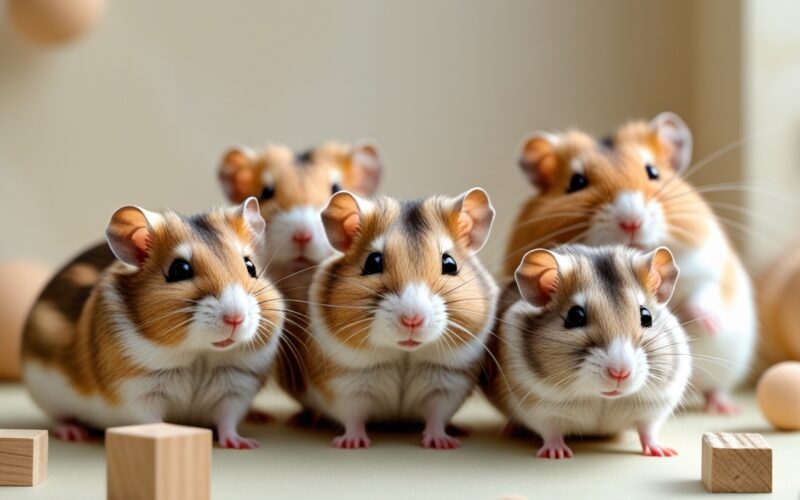Gerbil Grooming and Hygiene

Gerbil Grooming and Hygiene: Ensuring a Clean and Healthy Pet
Gerbils are naturally clean animals that spend a significant amount of time grooming themselves. Proper grooming and hygiene are essential for maintaining their health and well-being. As a pet owner, understanding gerbil grooming habits and implementing good hygiene practices can help ensure your gerbils stay healthy and comfortable. This comprehensive guide will cover various aspects of gerbil grooming and hygiene, including self-grooming, sand baths, nail trimming, cage cleaning, and tips for maintaining a clean environment.
Self-Grooming
Gerbils are meticulous groomers and engage in self-grooming behaviors to keep themselves clean. Grooming helps remove dirt, debris, and parasites from their fur, and it also plays a role in regulating body temperature.
Grooming Behavior
- Licking and Scratching: Gerbils use their tongues to lick their fur and paws, effectively cleaning themselves. They also use their hind legs to scratch hard-to-reach areas.
- Teeth Cleaning: Gerbils use their teeth to comb through their fur, removing tangles and debris.
- Mutual Grooming: In addition to self-grooming, gerbils often groom each other as a social behavior. Mutual grooming helps strengthen social bonds and ensures that hard-to-reach areas are cleaned.
Sand Baths
While gerbils do not require water baths, sand baths are essential for maintaining their fur condition and hygiene. Sand baths help absorb excess oils, remove dirt, and keep the fur clean and fluffy.
Providing a Sand Bath
- Sand Choice: Use chinchilla sand or specialized gerbil sand, which is fine and dust-free. Avoid using sand meant for reptiles or beach sand, as it can be too coarse and irritating for gerbils.
- Sand Bath Container: Provide a shallow, wide container filled with sand. The container should be large enough for your gerbil to roll around in comfortably.
- Frequency: Offer a sand bath to your gerbils several times a week. Some gerbils may enjoy daily sand baths, while others may prefer less frequent baths. Allow your gerbils to decide how often they use the sand bath.
- Cleaning: Regularly clean the sand bath container and replace the sand to ensure it remains clean and free of contaminants.
Nail Trimming
In the wild, gerbils naturally wear down their nails through digging and burrowing. However, pet gerbils may require occasional nail trimming to prevent overgrowth, which can lead to discomfort and health issues.
How to Trim Gerbil Nails
- Preparation: Gather small animal nail clippers, styptic powder (in case of bleeding), and a towel or cloth to hold your gerbil securely.
- Handling: Gently hold your gerbil in a secure but gentle grip. Wrapping your gerbil in a towel can help keep them calm and prevent sudden movements.
- Trimming: Carefully trim the tips of the nails, avoiding the quick (the pink part of the nail that contains blood vessels). If you accidentally cut the quick, apply styptic powder to stop the bleeding.
- Frequency: Trim your gerbil’s nails as needed, typically every few weeks. Regularly check their nails to determine when trimming is required.
Cage Cleaning
Maintaining a clean cage is essential for your gerbil’s health and hygiene. A dirty cage can lead to unpleasant odors, bacterial growth, and health issues.
Cleaning Routine
- Spot Cleaning: Perform daily spot cleaning by removing soiled bedding, uneaten food, and waste. This helps maintain a clean environment and reduces odors.
- Deep Cleaning: Conduct a thorough cleaning of the cage and accessories every two to four weeks. Follow these steps for deep cleaning:
- Remove Gerbils: Temporarily relocate your gerbils to a secure carrier or playpen.
- Empty the Cage: Remove all bedding, toys, and accessories from the cage.
- Clean the Cage: Wash the cage with warm water and a mild, pet-safe disinfectant. Rinse thoroughly to remove any residue.
- Clean Accessories: Wash toys, hideouts, and other accessories with warm water and mild soap. Rinse and dry thoroughly before returning them to the cage.
- Replace Bedding: Add fresh bedding to the cage, ensuring a deep layer for burrowing.
- Reassemble the Cage: Return all cleaned accessories, toys, and the food and water setup to the cage.
- Reintroduce Gerbils: Place your gerbils back into their clean, refreshed habitat.
Hygiene Tips
In addition to grooming and cleaning, there are several hygiene practices that can help keep your gerbils healthy and comfortable:
Bedding
- Safe Bedding: Use safe, dust-free bedding such as aspen shavings, paper-based bedding, or hay. Avoid using pine or cedar shavings, as they can release harmful oils and cause respiratory issues.
- Depth: Provide a deep layer of bedding (at least 6 inches) to allow your gerbils to dig and create tunnels. Burrowing is a natural behavior that helps keep them mentally and physically stimulated.
Diet and Water
- Fresh Food and Water: Provide fresh, clean water daily using a sipper bottle attached to the cage. Ensure the water bottle is functioning properly and refill it as needed. Offer a balanced diet with high-quality gerbil food, supplemented with fresh fruits and vegetables.
- Clean Feeding Areas: Clean food dishes and water bottles regularly to prevent the buildup of bacteria and mold.
Health Checks
- Regular Health Checks: Perform regular health checks to monitor your gerbil’s well-being. Look for signs of illness, such as changes in behavior, appetite, or appearance. Regularly check their teeth, nails, and fur for any issues.
- Veterinary Care: Schedule regular veterinary check-ups with a vet experienced in small animals. Address any health concerns promptly to ensure your gerbils receive the necessary care.
Conclusion
Proper grooming and hygiene are essential for maintaining the health and well-being of your gerbils. By understanding their self-grooming habits, providing regular sand baths, trimming their nails, maintaining a clean cage, and following good hygiene practices, you can ensure your gerbils stay clean, healthy, and comfortable. With the right care and attention, your gerbils can thrive and bring joy and companionship to your life.